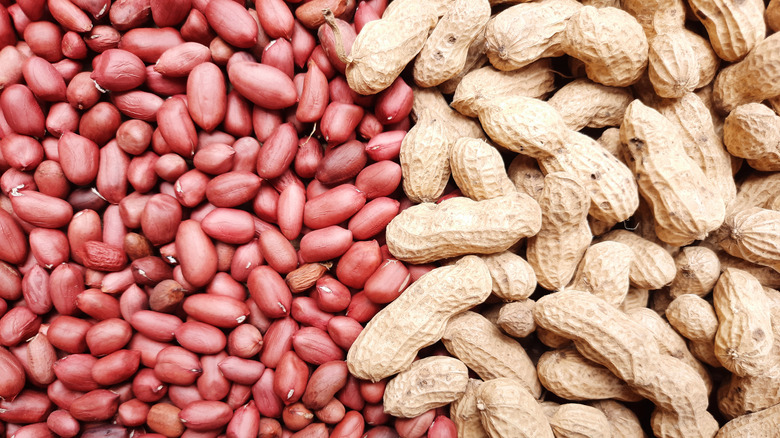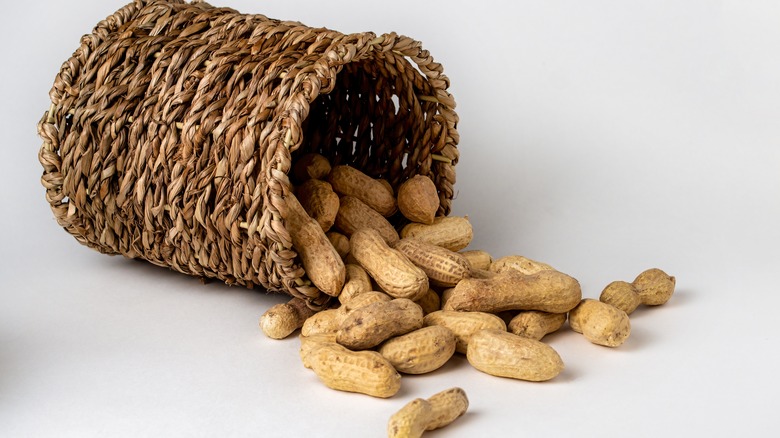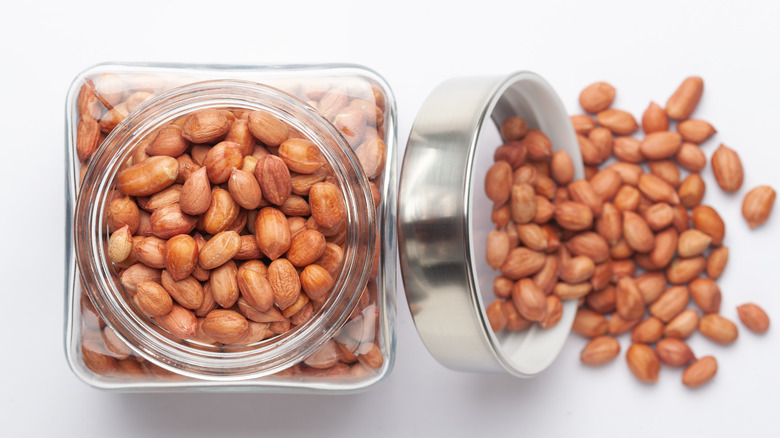What's The Best Way To Store Shelled Vs. Unshelled Peanuts?
Nuts are widely regarded as a healthy snack, and with very good reason. A handful of nuts contains a host of heart-healthy monounsaturated fats, protein, fiber, and antioxidants, according to Healthline. Peanuts, in particular, boast over 25 grams of protein, more than 8 grams of fiber, and just under 5 grams of sugar per 100-gram serving, according to Medical News Today. Peanuts contain a number of healthy monounsaturated and polyunsaturated fats and minerals like potassium, magnesium, calcium, and iron, as well as important nutrients like folate, vitamin E, and essential B vitamins. Thanks to their high quantities of fiber, protein, and healthy fats, adding peanuts to your diet has been shown to lower the risk of developing heart disease and stroke, and can help maintain a stable weight and blood sugar levels, per Medical News Today.
Peanuts are not only nutritious, but they are also convenient and easily portable, making them great for a mid-afternoon pick-me-up or healthy road trip snack. They do not need to be refrigerated, so they are easy to take on the go. They also have a very long shelf life, so they can easily be bought in bulk and enjoyed over a long period of time. However, just because they are easy to store, that doesn't mean they don't ever go bad.
Old peanuts can rot and go rancid
Peanuts will keep for quite a long time if they are stored in a sealed, airtight container out of direct sunlight and extreme heat. However, while they may not curdle after just a few days as milk does, peanuts can still spoil over time. As they age, peanuts will lose their satisfying crunch and develop an unappetizing bitter or sour taste, according to Nuts and Snacks.
And old peanuts don't just lose their crunch and flavor — it turns out that eating old peanuts can actually make you sick. Because they contain a high amount of fat, they can undergo a process called oxidation when exposed to air, which changes the chemical structure of the legume and causes them to go rancid. If they are exposed to moisture, peanuts may also grow mold and rot. Peanuts can also be carriers of dangerous bacteria like E. coli and Salmonella, according to the Government of Canada. Therefore, storing peanuts properly is important to ensure they retain their freshness and don't mold and spoil before their time. However, before you pack your peanuts away, you just might want to note whether or not they still have their shell.
Unshelled peanuts stay fresh longer than shelled peanuts
Peanuts can be sold in two different varieties: shelled and unshelled. Peanuts naturally grow surrounded by a hard casing made primarily of a plant fiber called cellulose, which is peeled and tossed before you can eat the tasty bean inside, according to Caterpickles. However, some people dislike the effort required to shell their own peanuts, so most stores offer a pre-shelled option. But the shell also plays an important role in helping preserve the peanut's freshness. The hard casing helps protect the nut from exposure to air, light, and moisture, all elements that can cause quality and flavor to erode over time.
Therefore, shelled peanuts tend to last longer than their unshelled counterparts. Shelled peanuts should be stored in an airtight container in a cool place, far away from moisture and humidity. If they are stored correctly, shelled peanuts typically keep around four months, according to Beezzly. However, unshelled peanuts in a pantry start to diminish in quality between one to two months. But regardless of if they have their shell or not, peanuts can keep for up to a year in the refrigerator, so keeping your peanuts cold is the best way to ensure they retain their flavor and freshness for as long as possible.


